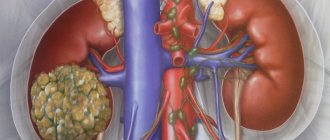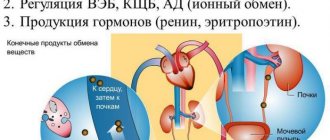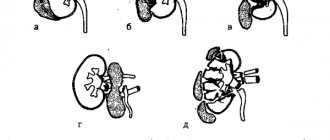Any chronic disease sooner or later leads to functional failure of the affected organ: it can no longer cope with the work assigned to it and begins to “fail.” The urinary system is no exception. What to do if your kidneys fail: why does this happen, how long does the patient have to live, and is there a chance of recovery?
Kidney failure and its causes
The kidneys are such an important organ in the human body that nature provided for the presence of two full-fledged structures in one body. This measure is extremely necessary, since the body performs several important functions:
- ridding the body of harmful products of chemical metabolic processes;
- maintaining the proper level of red blood cells that carry oxygen;
- constant correction of blood pressure levels;
The kidneys maintain blood pressure levels using hormones secreted by the juxtaglomerular apparatus.
- regulation of the mineral composition of the blood;
- chemical transformations of hormones and vitamins.
Basic chemical processes occur in nephrons. The kidney has several hundred similar structures. Each has two fundamentally different parts. The first is the vascular glomeruli. Here, under the influence of blood pressure, the liquid part of the blood with all the substances dissolved in it is filtered. This filtrate enters the convoluted renal tubules, where the second stage of purification occurs. It is necessary to separate everything useful from the tubules and send it into the bloodstream, after which harmful substances will be sent to the pelvis, urinary tract and then outside.
The processes of purifying the blood from waste and toxins take place in the nephrons.
Kidney failure is a serious disease in which the organ is unable to adequately perform any of its functions. In medical science, the term kidney failure is used. This process is essentially not an independent pathology. It is always preceded by a long-term or transient renal or general disease of the body. That is why kidney failure can occur in all categories of patients: children, adults and the elderly. However, each group has its own predominant causes of deficiency.
Kidney failure - video
The essence of kidney dysfunction in humans
If a person’s kidneys fail, this means that they have lost their functional ability and cannot work fully. Violation of the filtration and urinary function of organs is called renal failure. The disease is characterized by the death of nephrons, the structural units of the kidneys that produce urine.
Organic and inorganic metabolic products are excreted from the body with urine. But due to decreased kidney function, toxic substances accumulate in the blood. As a result, the acid-base and water-electrolyte balances, the functions of the cardiovascular, nervous, immune and other systems are disrupted.
Classification
There are several types of kidney failure:
- Based on the nature of the course, kidney failure is distinguished:
- spicy. In this case, the cells of the renal tubules suddenly die and the kidney actually stops working;
- chronic. Under the influence of the pathological process, nephrons gradually die. Over time, those who remain cease to cope with their responsibilities.
- According to the level of occurrence of the problem, they are distinguished:
- prerenal kidney failure. In this case, the flow of blood to the kidney is disrupted;
- real kidney failure. The reason lies in the tissue of the organ itself;
- postrenal. The failure in this case occurred due to a violation of the outflow of urine from the kidney.
Urolithiasis is the main cause of postrenal failure
Diagnostic methods
Diagnosis of patients with suspected acute or chronic urinary organ failure is based on:
- medical history and typical clinical picture;
- clinical blood and urine tests;
- data from the Rehberg test, urine analysis according to Zimnitsky;
- biochemical blood test (special attention to the level of creatinine and urea, reflecting the degree of dysfunction of the urinary organs);
- Ultrasound of the kidneys (allows you to find out how kidney failure developed, as well as the probable causes of the condition);
- other visual diagnostic methods (radiography, excretory urography, MRI and CT).
Symptoms and signs
Kidney failure is a multifaceted disease that results in typical symptoms. This set is somewhat different for acute and chronic processes.
Symptoms of kidney failure - table
| Acute kidney failure | Chronic kidney failure | ||
| Stage | Symptoms | Stage | Symptoms |
| Initial |
| Initial | Predominantly night urination |
| Oligoanuric |
| Polyuric |
|
| Polyuric | Large amount of urine excreted | Oligoanuric |
|
| recovery | Disappearance of symptoms | Terminal | Coma |
Acute form: symptoms
Acute renal failure is a process when there is a sharp disorder in the functioning of the kidneys. Loss of natural functionality occurs within a short time. A pathology develops, accompanied by a violation of the acid-base, water, electrolyte and osmotic balance. A delay in the production of nitrogen metabolism begins under the influence of dangerous processes in the renal bloodstream.
When the kidneys fail, the signs of the acute form of the disease manifest themselves as follows:
- A decrease in urine output during the day and even its complete absence.
- The appearance of swelling. The ankles and face swell noticeably. If you step on the scale, you will notice a clear weight gain.
- Loss of appetite and feeling of nausea. After some time, vomiting appears.
- General feeling of weakness. Possible increase in pressure.
- Pain syndrome that occurs in the place where the kidneys are located. The pain may radiate to the abdomen.
- Bloody traces appear in the urine and itchy skin.
If you do not respond to the signs of kidney failure in a timely manner, the manifestations will begin to intensify and become critical for the patient. As fluid accumulates in the body, the patient experiences shortness of breath. Consciousness becomes confused, which will soon lead to its complete loss.
If, in the event of kidney failure, no further action is taken, the patient will soon begin to develop hematomas on the body, which indicate internal bleeding, and involuntary muscle contraction will occur.
Prognosis and complications
The prognosis for treatment of kidney failure is extremely individual. In this case, the main role is played by the type of disease that caused the development of deficiency. The condition of the second kidney is of no small importance. Failure of both organs can cause serious complications:
- life-threatening heart rhythm disorders;
- disorders of consciousness up to coma;
- disruption of the functioning of all organs due to the accumulation of waste and toxins in the blood;
Kidney failure affects the functioning of the entire body
- unfavorable outcome.
Forecast
How long a patient can live with renal failure depends on timely and high-quality treatment. Often this pathology is preceded by the appearance of other serious diseases: heart attacks, diabetes, vascular damage, heart disease. There are cases when a person dies after kidney failure, but due to an attack of another disease.
Modern doctors are confident that even with kidney failure, a person can live quite a long time. True, this happens provided that the patient treats the symptoms and artificially purifies the blood. Hemodialysis is used for this. If the procedure is not carried out, the person dies within a few days.
There are currently no exact data on how many years patients live on artificial blood purification. However, according to rough estimates, hemodialysis on average extends the life of patients by 23 years. If the kidney fails, it is impossible to restore its function using conservative methods, but a transplant is possible. After a successful operation, you can live more than 20 years. However, finding a donor organ is very difficult, and the transplant itself is expensive.
There are no statistics on how long you have to live when your kidneys fail, but modern medicine assures you that there is a chance to survive and return to a full life. To do this, it is necessary to carry out symptomatic treatment and artificially purify the blood using hemodialysis. When such an opportunity arises, patients undergo organ transplantation and live for decades.
Causes
More than half of the cases are associated with injuries and surgery, 20% occur in obstetrics, and about 10% of cases of kidney dysfunction are associated with the use of medications. On the African continent, diseases are associated with viral infections, and in European countries with diabetes mellitus and high blood pressure. The following causes of renal failure have also been established:
- increased hemoglobin in the blood;
- kidney inflammation;
- infectious diseases such as hepatitis, HIV, etc.;
- organ injury or removal;
- urolithiasis disease;
- tumors of organs associated with the functioning of the kidneys (prostate, ureter, bladder);
- dystrophic lesion of retroperitoneal tissue;
- kidney tuberculosis.
These reasons can be either independent or act in tandem.
Inevitable Consequences
Failure of the kidneys entails life-threatening consequences. The most common consequences of kidney pathology:
- damage to the function of the central nervous system, which soon entails the death of the patient;
- progression of anemia, which manifests itself due to a reduced amount of erythropoietin production;
- impaired phagocytic and immune function of leukocytes, as a result of which the human body is affected by infections;
- development of hypertension and the occurrence of heart attack or stroke;
- bleeding in the gastrointestinal tract;
- failure of the liver and other internal organs;
- reduced amount of sex hormones.
Kinds
There are two types of kidney failure. The acute form (APR) is characterized by a sudden deterioration in kidney function, and this is due to the fact that the body ceases to fully eliminate the products of nitrogen metabolism. As a result, there are signs of a disorder in the patient’s water balance. The blood also undergoes changes, the general condition of the body is depressing.
In the chronic form (CRF), the process proceeds slowly, but over time, the functioning nephrons are significantly reduced, the kidney tissue is damaged and dies. This leads to intoxication of the body; in the chronic form, all symptoms and signs increase gradually, and the body is poisoned by the products of its own metabolism.
The cause of acute renal failure can be not only the above, but also the following:
- stress or shock;
- bleeding;
- heart failure.
In chronic renal failure, the following diseases or causes are often diagnosed in both women and men:
- diabetes;
- hypertonic disease;
- scleroderma;
- intoxication of the body, especially constant;
- pyelonephritis.
The presence of even one chronic form of the disease obliges the patient to regularly consult a doctor, since early diagnosis will help prevent the development of severe renal failure and prevent its chronic form.
Symptoms of kidney failure in pregnant women
If a woman suffered from pyelonephritis or glomerulonephritis before pregnancy, there is a risk of developing renal failure during pregnancy. During intrauterine development, the fetus begins to put pressure on the mother’s internal organs, resulting in lymph stasis in all organs. Extensive swelling often appears, and in addition to this, blood pressure begins to rise like surges. The kidneys are primarily affected, resulting in kidney failure. The symptoms are as follows:
- oliguria with transition to anuria (daily urine excreted by the kidneys becomes smaller and gradually disappears);
- irregular blood pressure (its sharp increase);
- swelling of the lower extremities and face;
- deterioration of general condition, vomiting, nausea and weakness;
- lack of appetite;
- characteristic pallor of the epithelial covers and fainting;
- changes in general blood count (large amounts of protein, urea and ammonia).
- a clear picture of general intoxication.
Important! Pregnant women diagnosed with chronic pyelonephritis or chronic glomerulonephritis should be observed by a nephrologist until the end of pregnancy. And at the first signs of renal failure, immediately seek specialized medical help.
Features in children
Kidney failure in children is caused by congenital pathologies and abnormal structure of the urinary system. Kidney failure occurs due to:
- renal vein thrombosis;
- toxic drug poisoning;
- dismetabolic nephropathy;
- necrosis of renal tissue;
- glomerulonephritis.
Primary signs of kidney failure are associated with poisoning by waste products that are no longer excreted in the urine:
- lethargy;
- lack of appetite;
- nausea;
- weight loss;
- smell of urine from the mouth;
- pericarditis;
- dry skin;
- swelling of the limbs.
Chronic renal failure in infants in half of the cases is manifested by uremia - intoxication due to retention of nitrogenous substances in the blood.
Toxins - kidney pests
When an organ is poisoned by toxins, organ failure may develop. Every fifth patient on hemodialysis suffers from nephrotoxins. In modern medicine, there have been many cases of diseases of the urinary organs from substances hazardous to them. These are Quinine, aminoglycoside antibacterial drugs, fluoride-containing pain medications and others.
Intoxication of the body, expressed as renal failure, also occurs with self-produced products. These are hemoglobin and myoglobin that come out of blood cells and muscles. The phenomenon is associated with splitting of muscle tissue due to injury, or nephrological disease with convulsions.
If the kidneys fail in a child or adult, the cause is also sought in the action of external toxins. These include alcohol, drugs, phosphorus, heavy metal salts, as well as chlorine and bromine derivatives, acetylsalicylic acid, sedatives and others. More recently, the harmful effects of statins and other drugs that lower cholesterol in the blood on the urinary system have been revealed.
What happens if both kidneys fail?
Failure of both kidneys inevitably leads to:
- disturbance of water-electrolyte balance;
- immunosuppression;
- neurological disorders;
- heart failure;
- gastrointestinal dysfunction;
- uremia and uremic coma;
- lethal outcome.
Dangerous complications arise in the absence of therapy. In case of proper treatment and elimination of all provoking factors, kidney function is gradually restored. To prevent chronic renal failure, patients with indolent nephritis, pyelitis, glomerulonephritis need to be examined by a nephrologist 2-3 times a year.









